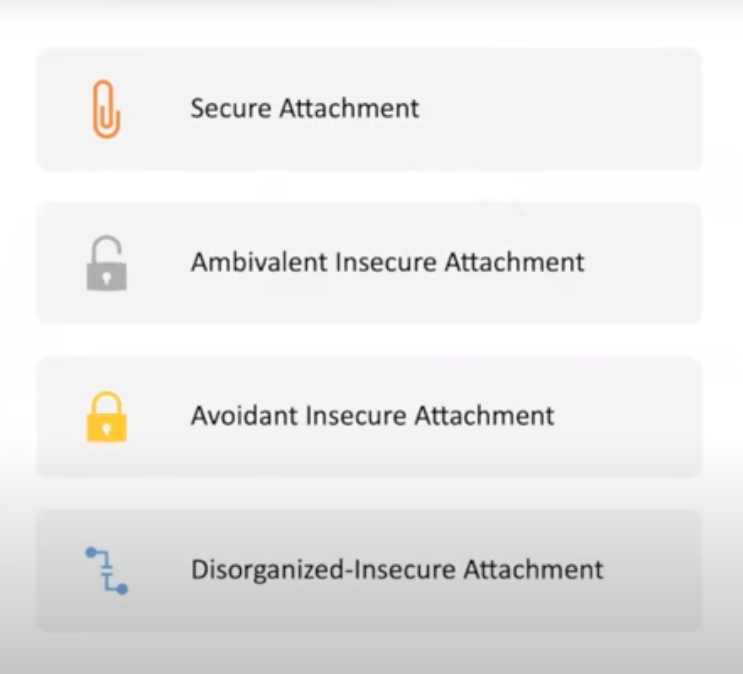
Relationships are such an important part to our mental health. The one relationship that has the most influence on all the other relationships we have later in life is the one with our parent or primary caregiver. This relationship molds the way we feel about ourselves, about others, and later with our children. We discuss how important the caregiver–child relationship is, and the attachment issues that can arise if this relationship is lacking.
Attachment theory and four types of attachment:

John Bowlby, a British psychologist and psychiatrist devoted extensive research to the concept of attachment describing it as “lasting psychological connectedness between human beings. Bowlby shared the psychoanalytic view that our early experiences in childhood have an important influence on our development and behavior later in life.
Our early attachment styles are established in childhood through the relationship between the infant and caregiver. A caregiver usually means the infant’s mother but can be any primary caregiver such as a father, grandparent, or adopted parent.
Mary Ainsworth was an American-Canadian developmental psychologist who also conducted extensive research in the emotional attachment between a child and its primary caregiver. From her research, Ainsworth concluded that there were three major styles of attachment. A fourth attachment style was also added recently by researchers Mary Main and Judith Solomon.
The Four Styles of Attachment:
Secure attachment:
This is the healthiest form of attachment, and describes an attachment where a child generally feels positive emotions and comfort when around the presence of their primary caregiver. Children in a secure attachment with their caregiver will seek comfort from their caregiver when frightened. They will prefer their caregiver to strangers, and have positive emotions when they are reunited with their parents after daycare. These children will grow into adults who typically have trusting, lasting relationships and tend to have good levels of self-esteem.
Ambivalent-insecure attachment:
Children who are in an ambivalent-insecure attachment with their caregiver may be receiving love and affection sporadically during infancy and childhood. When a caregiver is inconsistent in their love and affection towards a child, the child may have trouble understanding why this love and affection is provided in such an unpredictable manner. Children in an ambivalent-insecure attachment become greatly distressed when the parent leaves, but are not necessarily comforted by the return of their parent. As an adult, they become anxious and hesitant about relationships and may become reluctant to become close to others. They may worry needlessly that their partner does not love them and constantly worry that the love will fade.
Avoidant-insecure attachment:
Children who are in an avoidant-insecure attachment with their caregiver may avoid parents altogether. They do not seek much comfort or contact from their parents, and show little to no preference between a parent and a stranger. For young, pre-teen children to show indifference toward their caregiver is not normal. When these children grow into adults, they may have problems with intimacy and may invest little emotion in relationships. They often choose to remain detached from others.
Disorganized-insecure attachment:
This is considered to be the most extreme of the insecure attachment style. It is thought to be an outcome of trauma or abuse in childhood. Either they are a victim of abuse, or they have witnessed one parent abusing the other. They learn that the primary caregiver, someone responsible for the child’s safety, is also someone to be feared. These children at age 1 may show a mixture of avoidant and resistant behaviors. They may seem dazed, confused, or apprehensive. At age 8, they may even take on a parental role and some may even act as a caregiver towards the parent. They grow into adults who have difficulty with intimate relationships finding them confusing, and may be insensitive, selfish, controlling and even abusive towards their significant others. They crave relationships but are unable to develop deep ones. They have difficulty in taking responsibility for actions.
Ainsworth concluded, along with additional research, that early attachment styles can help predict behaviors later in life.
Causes of attachment issues:
Attachment issues will arise when the child is not able to bond or attach to the parent / caregiver adequately. There are many reasons why this happens. For example, a child may be born with a medical condition such as Autism Spectrum Disorder, deafness, or skin problems where the infant suffers and cries. The constant crying and reacting may cause a parent to not feel ‘attached’ to their children.
Another example may involve some sort of trauma where the parent/caregiver was going through some extremely difficult times. Perhaps they had the infant during a war or some other hardship, where they were so preoccupied with worry that they were unable to bond fully with their child.
It can also be due to a narcissistic caregiver or an abusive household who put themselves first before their child.
Necessary input for attachment:
In order to form a secure attachment with one’s child as the primary caregiver, these are some of the necessary inputs:
Eye contact: Warm, loving, and soft eye contact.
Touch: Unrehearsed affection such as hugs and pats on the back
Movement: Bouncing, rocking to soothe your child
Smiles: Smile often at your children
Nutrition: Proper nutrition; children in foster care or orphanages do not always receive proper nutrition.
Time: Quality time spent doing things like singing, reading rhymes, and mimicking.
How we treat attachment issues: Genograms
We use a genogram to treat attachment issues. A genogram is a visual representation of a family tree that displays detailed information about the relationships between each individual in the family.
Genograms help a therapist and patient to identify and understand various patterns in the patient’s family history that may have trickled down and influenced the patient’s childhood. They work together to identify patterns of behavior, communication, addiction, and relationships in the family history. We use this so that the child can better understand what happened during their earliest years and may be able to work through any resentment or anger they feel towards their primary caregiver.
For example, we had a patient who had attachment issues with their mother. Creating a genogram helped them understand that their mother had to undergo trauma as a child herself. The patient realized that their mother never meant to be cruel or negligent, she just didn’t know.
Another patient had serious issues with their spouse because they would resort to name-calling and screaming when angry. Looking at their genogram, they realized a pattern: their father would do this to his wife, and the father’s father would also do this to his wife. The pattern kept repeating itself down the family line.
Generational trauma in the Bible:
In the Bible, we see the sin of favoritism repeating itself and passing down conflict and strife between siblings from one generation to the next.
Abraham loved his son Ishmael who was born of his second wife Hagar, but his wife Sarah was jealous and preferred her own son Isaac. Eventually Ishmael and his wife Hagar were banished to the desert and Abraham made Isaac his sole heir. This eventually led to a breach between the descendants of Ishmael and the descendants of Isaac: those practicing Islam, and those practicing Judaism – which still exists to this day.
Abraham’s son Isaac and his wife Rebekah also repeat this pattern of displaying favoritism. They have two fraternal twins, Jacob and Esau, who were fighting even before they were born in Rebekah’s womb. Esau, the elder son, was a skillful hunter and was Isaac’s favorite. Jacob, a quiet man who was good with household duties, was Rebekah’s favorite. Eventually, Jacob and his mother together hatched a scheme to rob Esau of his birthright. They deceived Isaac by having Jacob dress up in Esau’s clothes so that he would receive his blessing.
Jacob would also have two wives Leah and Rachel. He would come to favor the sons born out of Rachel more than the ones from Leah. Eventually, the sons of Leah were driven to jealousy and resentment towards their brother Joseph who they sold into slavery to the Egyptians.
Joseph becomes blessed by God and ends up having two sons. He does not repeat this generational sin of favoritism. Between his two sons, he asks his father Jacob to bless and pray for them both. Joseph was able to notice the generational sins of his forefathers and learned something different by the grace of God.
Attachment to God:
The healthy attachment cycle will typically start off with a need. Usually the child is either hungry or tired and will then start exhibiting a “rage reaction.” The child will start screaming, acting out, and letting their needs be known to the parent/caregiver. The caregiver in turn provides relief by feeding the child or lulling them into sleep. The child in turn feels gratified. Each time this cycle happens, the trust that the child has for the caregiver grows. Attachment theory shows that children need someone to attach to otherwise attachment issues arise.
As children of God, we can also experience this. In fact, the most perfect being we can attach to is God. As children of God, we are blessed with the promise that God’s love for us is constant and unwavering. He has a plan for us, and will always provide for us. As humans, we have our emotional, psychological, and spiritual needs. When we start feeling these needs, we enter into a “rage reaction” which manifests in many different ways and varying levels of intensity: frustration, disappointment, stress, anxiety, anger, depression.
Parents can let us down, but God is the only being who will never let us down. If we continue nurturing our relationship with God and attach to him, the trust will only grow. The Bible is filled with examples of this promise.
Psalm 23: 1-6: The LORD is my shepherd, I lack nothing. He makes me lie down in green pastures, he leads me beside quiet waters, he refreshes my soul. He guides me along the right paths for his name’s sake. Even though I walk through the darkest valley, I will fear no evil, for you are with me; your rod and your staff, they comfort me. You prepare a table before me in the presence of my enemies. You anoint my head with oil; my cup overflows. Surely your goodness and love will follow me all the days of my life, and I will dwell in the house of the LORD forever.
As humans, we need to feel secure and safe. Some of us may not have had a parent or caregiver who was able to do this to the best of their ability. Nevertheless, we have God who will never forsake us. We can feel fully safe and secure with Him.
Enjoyed our blogpost? Subscribe to our newsletter for more resources on mental health and integrating the Gospel message in your healing journey.
If you found our resources useful, please consider donating to Oak Health Foundation, which is a 501(3)c nonprofit dedicated to providing resources regarding holistic mental healthcare and subsidized treatment for those in need.




